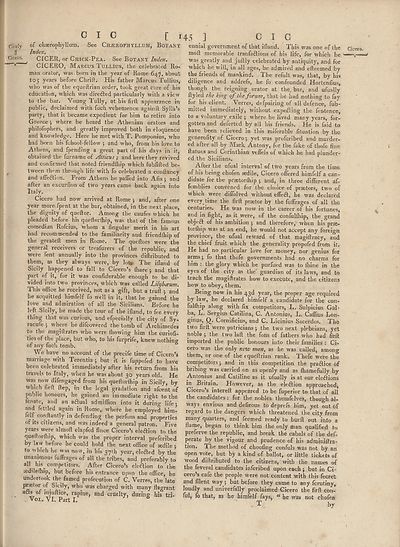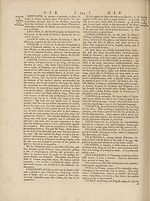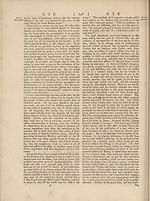Encyclopaedia Britannica, or, a Dictionary of arts, sciences, and miscellaneous literature : enlarged and improved. Illustrated with nearly six hundred engravings > Volume 6, CHI-Crystallization
(155) Page 145
Download files
Complete book:
Individual page:
Thumbnail gallery: Grid view | List view

C I C [I
of chaerophyllum. See Ch^erophyllum, Botany
Index.
CICER, or Chick-Pea. See Botany Index.
CICERO, Marcus Tullius, the celebrated Ro¬
man orator, was born in the year of Rome 647, about
I05 years before Chrift. His father Marcus Tullius,
who was of the equeftrian order, took great Care of his
education, which was direded particularly with a view
to the bar. Young Tully, at his firft appearance in
public, declaimed with fuch vehemence againft Sylla’s
party, that it became expedient for him to retire into
Greece ; where he heard the Athenian orators and
philofophers, and greatly improved both in eloquence
and knowledge. Here he met with T. Pomponius, who
had been his fchool-fellow ; and who, from his love to
Athens, and fpending a great part of his days in it,
obtained the furname of Atticus ; and here they revived
and confirmed that noted friendfliip which fubfifted be¬
tween them through life with fo celebrated a conftancy
and affection. From Athens he pafled into Afia j and
after an excurfion of two years came back again into
Italy.
Cicero had now arrived at Rome j and, after one
year more fpent at the bar, obtained, in the next place,
the dignity of queftor. Among the caufes which he
pleaded before his quetlorfhip, was that of the famous
comedian Rofcius, whom a fmgular merit in his art
had recommended to the familiarity and friendfhip of
the greateft men in Rome. The queftors were the
general receivers or treafurers of the republic, and
were fent annually into the provinces diftributed to
them, as they always were, by lot* The ifland of
Sicily happened to fall to Cicero’s (hare $ and that
part of it, for it was confiderable enough to be di¬
vided into two provinces, which was called Lilybceum.
This office he received, not as a gift, but a truft ; and
he acquitted himfelf fo well in it, that he gained the
love and admiration of all the Sicilians. Before he
left Sicily, he made the tour of the ifland, to fee every
thing that was curious, and efpecially the city of Sy-
racufe ; where he difcovered the tomb of Archimedes
to the magiftrates who were fhowing him the curiofi-
tiesof the place, but who, to his furprife, knew nothing
of any fuch tomb.
We have no account of the precife time of Cicero’s
marriage with lerentia j but it is fuppofed to have
been celebrated immediately after his return from his
travels to Italy, when he was about 30 years old. He
was now difen gaged from his queftorfhip in Sicily, by
which firft ftep, in the legal gradation and afcent of
public honours, he gained an immediate right to the
fenate, and an a&ual admiffion into it during life*
and fettled again in Rome, where he employed him¬
felf conftantly in defending the perfons and properties
of its citizens, and was indeed a general patron. Five
years were almoft elapfed fince Cicero’s ele&ion to the
queftorfhip, which was the proper interval prefcribed
by law before he could hold the next office of gedile j
to which he was now, in his 37th year, eleaed by the’
unanimous fuffrages of all the tribes, and preferably to
all his competitors. After Cicero’s eleaion to the
aedilefhip, but before his entrance upon the office, he
undertook the famed profecution of C. Verres, the late
pr*t°r of Sicily, who was charged with many flagrant
acts^of injuftice, rapine, and cruelty, during his tri-
45 ] C I C
ennial government of that ifiand. This was one of the
moft memorable tranfaclions of his life, for which he
was greatly and juftly celebrated by antiquity, and for
which he will, in all ages, be admired and efteemed by
the friends of mankind. The refult was, that, by his
diligence and addrefs, he fo confounded Hortenfius,
though the reigning orator at the, bar, and ufually
flyled the king of the forum, that he had nothing to fay
for his client. Verres, defpairing of all defence, fub-
mitted immediately, without expelling the fentence,
to a voluntary exile ; where he lived many years, for¬
gotten and deferted by all his friends. He is faid to
have been relieved in this miferable fituation by the
generofity of Cicero *, yet was profcribed and murder¬
ed after all by Mark Antony, for the fake of thofe fine
ftatues and Corinthian vtffels of which he had plunder¬
ed the Sicilians.
After the ufual interval of two years from the time
of his being chofen aedile, Cicero offered himfelf a can¬
didate for the prstorlhip j and, in three different af-
femblies convened for the choice of praetors, two of
which were diffolved without effect, he was declared
every time the firft praetor by the fuffrages of all the
centuries. He was now in the career of his fortunes,
and in fight, as it were, of the confullhip, the grand
object of his ambition ; and therefore, when his pra£-
torthip was at an end, he would not accept any foreign
province, the ufual reward of that magiftracy, and
the chief fruit which the generality propofed from it.
He had no particular love for money, nor genius for
arms j fo that thofe governments had no charms for
him : the glory which he purfued was to fliine in the
eyes of the city as the guardian of its laws, and to
teach the magiftrates how to execute, and the citizens
how to obey, them.
Being now in his 43d year, the proper age required
by law, he declared himfelf a candidate for the con-
fulthip along with fix competitors, L. Sulpicius Gal-
ba, L. Sergius Catilina, C. Antonius, L. Caflius Lon¬
ginus, £). Cornificius, and C. Licinius Sacerdos. The
two firft were patricians j the two next plebeians, yet
noble j the two laft the fons of fathers who had firft
imported the public honours into their families : Ci¬
cero was the only new man, as he was called, among
them, or one of the tqueftrian rank. Thefe were the
competitors j and in this competition the pra&ice of
bribing was carried on as openly and as fhamefully by
Antonius and Catiline as it ufually is at our ele&ions
in Britain. However, as the eledlion approached,
Cicero’s intereft appeared to be fuperior to that of all
the candidates: for the nobles themfelves, though al¬
ways envious and defirous to deprefs him, yet out of
regard to the dangers which threatened the city from
many quarters, and feemed ready to burft out into a
flame, began to think him the only man qualified to
preferve the republic, and break the cabals of the def-
perate by the vigour and prudence of his adminiftra-
tion. The method of chooling confuls was not by an
open vote, but by a kind of ballot, or little tickets of
wood diftributed to the citizens, with the names of
the feveral candidates infcribed upon each j but in Ci¬
cero’s cafe the people were not content with this fecret
and filent way 5 but before they came to any fcrutiny,
loudly and univerfaRy proclaimed Cicero the firft con-
ful, fo that, as he himfelf fays, “ he was not chofexi
T by
of chaerophyllum. See Ch^erophyllum, Botany
Index.
CICER, or Chick-Pea. See Botany Index.
CICERO, Marcus Tullius, the celebrated Ro¬
man orator, was born in the year of Rome 647, about
I05 years before Chrift. His father Marcus Tullius,
who was of the equeftrian order, took great Care of his
education, which was direded particularly with a view
to the bar. Young Tully, at his firft appearance in
public, declaimed with fuch vehemence againft Sylla’s
party, that it became expedient for him to retire into
Greece ; where he heard the Athenian orators and
philofophers, and greatly improved both in eloquence
and knowledge. Here he met with T. Pomponius, who
had been his fchool-fellow ; and who, from his love to
Athens, and fpending a great part of his days in it,
obtained the furname of Atticus ; and here they revived
and confirmed that noted friendfliip which fubfifted be¬
tween them through life with fo celebrated a conftancy
and affection. From Athens he pafled into Afia j and
after an excurfion of two years came back again into
Italy.
Cicero had now arrived at Rome j and, after one
year more fpent at the bar, obtained, in the next place,
the dignity of queftor. Among the caufes which he
pleaded before his quetlorfhip, was that of the famous
comedian Rofcius, whom a fmgular merit in his art
had recommended to the familiarity and friendfhip of
the greateft men in Rome. The queftors were the
general receivers or treafurers of the republic, and
were fent annually into the provinces diftributed to
them, as they always were, by lot* The ifland of
Sicily happened to fall to Cicero’s (hare $ and that
part of it, for it was confiderable enough to be di¬
vided into two provinces, which was called Lilybceum.
This office he received, not as a gift, but a truft ; and
he acquitted himfelf fo well in it, that he gained the
love and admiration of all the Sicilians. Before he
left Sicily, he made the tour of the ifland, to fee every
thing that was curious, and efpecially the city of Sy-
racufe ; where he difcovered the tomb of Archimedes
to the magiftrates who were fhowing him the curiofi-
tiesof the place, but who, to his furprife, knew nothing
of any fuch tomb.
We have no account of the precife time of Cicero’s
marriage with lerentia j but it is fuppofed to have
been celebrated immediately after his return from his
travels to Italy, when he was about 30 years old. He
was now difen gaged from his queftorfhip in Sicily, by
which firft ftep, in the legal gradation and afcent of
public honours, he gained an immediate right to the
fenate, and an a&ual admiffion into it during life*
and fettled again in Rome, where he employed him¬
felf conftantly in defending the perfons and properties
of its citizens, and was indeed a general patron. Five
years were almoft elapfed fince Cicero’s ele&ion to the
queftorfhip, which was the proper interval prefcribed
by law before he could hold the next office of gedile j
to which he was now, in his 37th year, eleaed by the’
unanimous fuffrages of all the tribes, and preferably to
all his competitors. After Cicero’s eleaion to the
aedilefhip, but before his entrance upon the office, he
undertook the famed profecution of C. Verres, the late
pr*t°r of Sicily, who was charged with many flagrant
acts^of injuftice, rapine, and cruelty, during his tri-
45 ] C I C
ennial government of that ifiand. This was one of the
moft memorable tranfaclions of his life, for which he
was greatly and juftly celebrated by antiquity, and for
which he will, in all ages, be admired and efteemed by
the friends of mankind. The refult was, that, by his
diligence and addrefs, he fo confounded Hortenfius,
though the reigning orator at the, bar, and ufually
flyled the king of the forum, that he had nothing to fay
for his client. Verres, defpairing of all defence, fub-
mitted immediately, without expelling the fentence,
to a voluntary exile ; where he lived many years, for¬
gotten and deferted by all his friends. He is faid to
have been relieved in this miferable fituation by the
generofity of Cicero *, yet was profcribed and murder¬
ed after all by Mark Antony, for the fake of thofe fine
ftatues and Corinthian vtffels of which he had plunder¬
ed the Sicilians.
After the ufual interval of two years from the time
of his being chofen aedile, Cicero offered himfelf a can¬
didate for the prstorlhip j and, in three different af-
femblies convened for the choice of praetors, two of
which were diffolved without effect, he was declared
every time the firft praetor by the fuffrages of all the
centuries. He was now in the career of his fortunes,
and in fight, as it were, of the confullhip, the grand
object of his ambition ; and therefore, when his pra£-
torthip was at an end, he would not accept any foreign
province, the ufual reward of that magiftracy, and
the chief fruit which the generality propofed from it.
He had no particular love for money, nor genius for
arms j fo that thofe governments had no charms for
him : the glory which he purfued was to fliine in the
eyes of the city as the guardian of its laws, and to
teach the magiftrates how to execute, and the citizens
how to obey, them.
Being now in his 43d year, the proper age required
by law, he declared himfelf a candidate for the con-
fulthip along with fix competitors, L. Sulpicius Gal-
ba, L. Sergius Catilina, C. Antonius, L. Caflius Lon¬
ginus, £). Cornificius, and C. Licinius Sacerdos. The
two firft were patricians j the two next plebeians, yet
noble j the two laft the fons of fathers who had firft
imported the public honours into their families : Ci¬
cero was the only new man, as he was called, among
them, or one of the tqueftrian rank. Thefe were the
competitors j and in this competition the pra&ice of
bribing was carried on as openly and as fhamefully by
Antonius and Catiline as it ufually is at our ele&ions
in Britain. However, as the eledlion approached,
Cicero’s intereft appeared to be fuperior to that of all
the candidates: for the nobles themfelves, though al¬
ways envious and defirous to deprefs him, yet out of
regard to the dangers which threatened the city from
many quarters, and feemed ready to burft out into a
flame, began to think him the only man qualified to
preferve the republic, and break the cabals of the def-
perate by the vigour and prudence of his adminiftra-
tion. The method of chooling confuls was not by an
open vote, but by a kind of ballot, or little tickets of
wood diftributed to the citizens, with the names of
the feveral candidates infcribed upon each j but in Ci¬
cero’s cafe the people were not content with this fecret
and filent way 5 but before they came to any fcrutiny,
loudly and univerfaRy proclaimed Cicero the firft con-
ful, fo that, as he himfelf fays, “ he was not chofexi
T by
Set display mode to:
![]() Universal Viewer |
Universal Viewer | ![]() Mirador |
Large image | Transcription
Mirador |
Large image | Transcription
Images and transcriptions on this page, including medium image downloads, may be used under the Creative Commons Attribution 4.0 International Licence unless otherwise stated. ![]()
| Permanent URL | https://digital.nls.uk/193009438 |
|---|
| Attribution and copyright: |
|
|---|
| Description | Ten editions of 'Encyclopaedia Britannica', issued from 1768-1903, in 231 volumes. Originally issued in 100 weekly parts (3 volumes) between 1768 and 1771 by publishers: Colin Macfarquhar and Andrew Bell (Edinburgh); editor: William Smellie: engraver: Andrew Bell. Expanded editions in the 19th century featured more volumes and contributions from leading experts in their fields. Managed and published in Edinburgh up to the 9th edition (25 volumes, from 1875-1889); the 10th edition (1902-1903) re-issued the 9th edition, with 11 supplementary volumes. |
|---|---|
| Additional NLS resources: |
|

